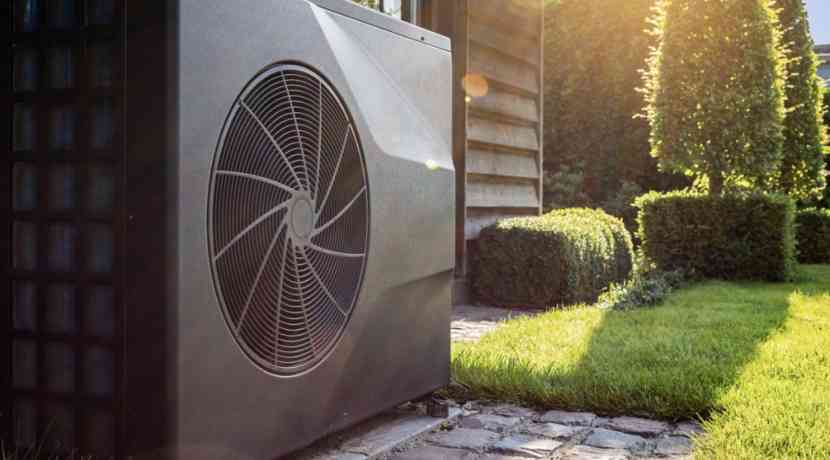Study of the efficiency of air source heat pumps
differences June 14, 2024 11:56 a.m. Dennis L. New analyzes highlight the many advantages of air-to-air heat pumps over air-to-water heat pumps. These systems are distinguished not only by their low installation costs and easy maintenance, but also by their versatile application possibilities. )kcotS ebodaslewuaP ycnaN(Photo: © Air-air heat pumps are effective And versatile Low […]

differences
Dennis L.
New analyzes highlight the many advantages of air-to-air heat pumps over air-to-water heat pumps. These systems are distinguished not only by their low installation costs and easy maintenance, but also by their versatile application possibilities.
)kcotS ebodaslewuaP ycnaN(Photo: ©
- Air-air heat pumps are effective And versatile
- Low installation costs and easy maintenance
- Aerothermal heat pumps reduce CO2 emissions And operating cost considerably
How do air-to-air and air-to-water heat pumps compare in terms of efficiency? A detailed study highlights the differences in terms of energy efficiency, environmental balance and economic aspects of the two systems. The results provide new insights into the potential benefits of air-to-air heat pumps under specific conditions and contribute to informed decision-making in the field of sustainable heating technologies.
Dresden (Germany). Air source heat pumps are central elements of modern heating technology based on renewable energy. They use ambient heat from the air to efficiently heat or cool buildings. There are two main types of air source heat pumps: air-to-air and air-to-water heat pumps. While air-to-air heat pumps use outdoor air directly to heat indoor air, air-to-water heat pumps convert outdoor air into heat, which is then transferred to a water system that supplies the radiators or underfloor heating. These technologies offer a promising alternative to traditional heating systems, offering potentially high energy savings and reductions in CO2 emissions.
In recent years, air source heat pumps have developed significantly in terms of efficiency and environmental friendliness. The global heat pump market is experiencing steady growth, driven by rising energy prices and increasing awareness of climate protection. According to a report from International Energy Agency from 2022 The use of heat pumps is expected to quadruple by 2030 to meet global climate goals. This development highlights the importance of detailed comparisons of different heat pump systems in order to make informed decisions on which technology gives the best results under specific conditions. This article therefore analyzes and compares in detail the differences in efficiency, environmental impact and economic aspects of air-air and air-water heat pumps.
Efficiency differences between air-to-air and air-to-water heat pumps
Air-to-air heat pumps and air-to-water heat pumps differ significantly in efficiency, which has different effects in different application areas. Air-air heat pumps extract heat from the outside air and transfer it directly to the indoor air, making them particularly effective for well-insulated buildings that do not require conventional heating systems such as radiators or underfloor heating. These systems are particularly beneficial in temperate climates where temperature extremes are rare, as their effectiveness can decrease in extremely cold weather. One of the main benefits of air-to-air heat pumps is their ability to not only heat but also cool, making them a year-round solution. Studies show that air-to-air heat pumps are able to significantly reduce a household’s energy consumption by achieving a high seasonal coefficient of performance (SCOP).
In contrast, air-water heat pumps use outside air to heat water, which then circulates through radiators or underfloor heating. These systems are often more efficient in colder climates because they can still achieve relatively high yields even at lower outdoor temperatures. Air-water heat pumps are also more versatile since they can be used for both heating and hot water production. However, they have higher installation and maintenance costs than air-to-air heat pumps, and their efficiency can depend largely on the specific installation and operating conditions. Research shows that air-water heat pumps are particularly effective in new buildings or major renovations of existing buildings, as they are often used in combination with modern, well-insulated structures.
Environmental and cost analysis of air source heat pumps
Environmental analysis of aerothermal heat pumps shows that these systems offer a significant reduction in CO2 emissions compared to conventional heating systems. Air source heat pumps use ambient heat, which means they use far less fossil fuels and therefore significantly reduce emissions. According to a report by the International Energy Agency (IEA), air source heat pumps can reduce global CO2 emissions by at least 500 million tonnes by 2030, equivalent to the annual emissions of all cars in Europe. Additionally, modern technologies and improved refrigerants help to further reduce the ecological footprint. In combination with increasing use of green electricity the use of air source heat pumps become an essential part of the climate protection strategy. The environmental benefits are particularly evident in regions that rely heavily on carbon-intensive heating systems.
The cost analysis of air source heat pumps shows a differentiated picture. Although the initial cost of air-source heat pumps, particularly for air-water systems, can be relatively high, these costs are recouped through significant savings in operating costs. According to a study by the Fraunhofer Institute, the operating costs of an air-air heat pump can be up to 50% lower than those of a conventional heating system. Additionally, many countries offer financial incentives and support programs to support the installation of heat pumps, further reducing the initial investment. For example, Germany offers subsidies for the installation of heat pumps through the Federal Fund for Efficient Buildings (BEG). Despite the higher initial costs, air source heat pumps represent an economically sound long-term investment that not only reduces operating costs but can also increase property value.
Practical applications and advantages of air-air heat pumps
Air-to-air heat pumps offer many practical applications and benefits that make them an attractive option for residential and commercial users. A notable advantage of these systems is their ability to have dual functionality: they can both heat and cool. This characteristic makes them particularly useful in temperate climate regions where temperature requirements vary greatly throughout the year. In well-insulated buildings, air-air heat pumps demonstrate remarkable efficiency, maintaining indoor air at a consistently comfortable temperature while minimizing energy consumption. According to a study by the Fraunhofer Institute, these systems can reduce energy consumption by up to 50 percent, which not only reduces operating costs, but also makes a significant contribution to climate protection.
Another significant advantage of air-air heat pumps is their easy and inexpensive installation. Compared to other heating and cooling systems such as underfloor heating or central air conditioning, air-to-air heat pumps do not require complex piping. This not only reduces installation costs, but also minimizes the risk of water damage, thereby reducing long-term maintenance costs. This simplicity makes them particularly attractive for use in existing buildings, where extensive renovations are often not feasible. Air-to-air heat pumps also help improve air quality because they are equipped with filters that remove dust, pollen and other air pollutants. This is particularly the case in urban areas beneficial where air pollution is a serious problem.
Air source heat pumps also help increase property values. In many countries, properties with modern, energy-efficient heating and cooling systems are valued more highly. This is due not only to falling operating costs, but also to the growing demand for environmentally friendly technologies. A study from the National Renewable Energy Laboratory (NREL) shows that homes equipped with heat pump systems have a higher resale value as buyers increasingly look for sustainable and cost-effective solutions. Additionally, many countries offer financial incentives and support programs to encourage the installation of heat pumps, which significantly reduces the initial investment.














